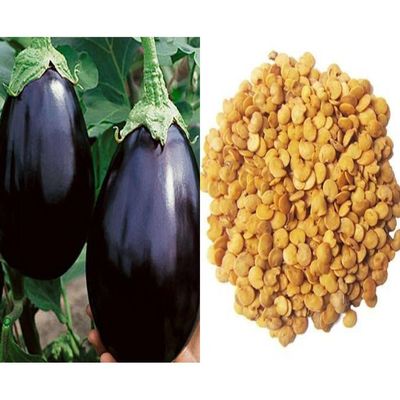
Eggplant seeds
 Gangagardens
Gangagardens
Round, purple, hardy, delicious and full of nutrients,
Images are for reference purposes only.
Actual product may vary in shape or appearance based on climate, age, height, etc.
The product is replaceable but not returnable.
Item Details
SKU
AVEGGPSED12
How to plant eggplant
Stake the plants right away (just an inch or two from the plant) to provide support as they climb and to avoid disturbing the soil later. If you live in a cold climate, consider using row covers to keep the eggplants warm and sheltered. Open the ends of the row covers on warm days so that the bees may pollinate. If transplanting, set 3- to 4-inch tall seedlings 2 to 2½ feet apart in rows that are 3 to 4 feet apart.
Care
Eggplant will fall over once loaded with fruit! Be sure to stake tall plants or use a cage to keep the plants upright. If growing eggplant in containers, stake the stems before the fruit forms. For bigger fruits, restrict to five or six per plant. Pinch out the terminal growing points for a bushier plant.
Pests/Diseases
Flea beetles are probably the most common pest, but a healthy eggplant should be able to withstand damage from their tiny holes. Damage is usually serious only on young seedlings. Grow plants under row covers until they are large enough to tolerate leaf damage. Remove garden debris in the fall to remove any overwintering beetles. Powdery Mildew can affect eggplant. This appears as white, powdery spots on the leaves which may turn yellow and die. The best method of control is prevention. Planting resistant varieties when available, planting in full sun, and provide good air circulation. Water at the soil level, not on the leaves. Tomato Hornworms are sometimes an issue as are Colorado potato beetles, lace bugs, and mites.
_-_Bulbs_(set_of_10)_2.webp)
_-_Bulbs_(set_of_10)_3.webp)